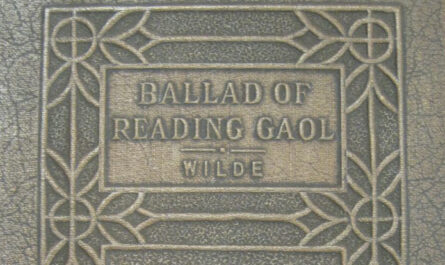
For me, “conduct book” conjures up a stuffy, pedantic tract preaching morality and social restraint to young ladies, but even the briefest exploration of our rare book collection reveals just how limiting this assessment of the genre is. Yes, much conduct literature was addressed to women, but men weren’t off the hook when it came to comportment – in fact, as landowners, politicians, professionals, or tradesmen, they were expected to cultivate public personae as well as maintain moral standards in their private lives. Our pre-1820 collection yields examples of two formats in which seventeenth- and eighteenth-century men’s conduct books were published: a general guide for the public, The Gentleman’s Library (1744); and a book of letters addressed to the author’s children, Instructions to a Son Containing Rules of Conduct in Publick and Private Life (1743) by Archibald Campbell, Marquis of Argyll.
While both works advise young men on everything from language and dress to marriage and religion, they diverge in tone, audience, and format. The Gentleman’s Library professes to fill a hole in conduct literature for men by taking a place on the shelf beside well-known women’s equivalents, The Ladies’ Library and Advice to a Daughter. In the introduction, the anonymous author, “Celadon,” recounts how the idea for this book came about through playful banter with “the brisk Florimel, and her witty Associates” (GL 1) at a dinner party. Chastised by these clever ladies for his impertinent behavior, he recognizes the need for a book from which men can draw examples of proper conduct. The use of classical names and archetypal characters in the introduction veils the author’s identity, making him a sort of educated, authoritative “everyman.” He carries this persona throughout the work, addressing men of varied stations both directly (advising that boys destined for trade don’t waste time learning “the Roman Language,” but rather focus on “Writing a good Hand” and “Casting Acompts” [GL 41-42]) and indirectly (by translating all classical references into English for the Latin illiterate).

While the author of The Gentleman’s Library offers his mixed audience mainly sound advice, he has an inclination for florid phrases and pedantry (though he claims to detest both). He may come down hard on those he sees as ridiculous (the world’s “intolerable Fops” [GL 48], “Retailers of Fragments” [GL 32], and “Tattlers” [GL 315]), but sometimes veers into ridiculousness himself. Here’s a classic example of his Polonius complex at play (he swears, he uses no art at all!):
“The best Art of Speech shews itself under a natural Dress. Our Discourse should never smell of Study and Elaborateness: It is a Pedantry that deserves not the Benefit of Pardon… Too much Fancy is not necessary in our Conversations; it begets vain and puerile Ideas, which tend neither to make us wiser nor better” (GL 79-80).
While “Celadon” may not have intended such passages to read, “do as I say, not as I do,” Archibald Campbell’s Instructions to a Son is full of references to the author’s mistakes as negative examples. Written in simple language reflective of the author’s humility, this collection of letters, composed by the Marquis of Argyll in 1661 as he awaited execution for political offenses, is the cautionary legacy of a father preparing his children for a future without his guidance. He alludes to the social and financial hole he has dug his children into, reproaching himself, but also directing them to take solace in religion, follow the moral example of their mother, and heed the mentors to whom he has entrusted their educations. He sets down advice for future milestones, such as choosing a pious spouse, heads off any thoughts they might have of avenging his death, and transfers authority to his eldest son and heir (whom, he says, “is my substitute” [16]). The overall collection of thoughts on various topics, from how to comport oneself at court (or better yet, how to steer clear of it) to the proper exercise of body and mind, is a heart-wrenching, private goodbye that, through publication, has been made a general example.
There’s much more to be explored in both works – from how The Gentleman’s Library engages with Locke’s Some Thoughts Concerning Education to how both authors view religion as central to education and marriage as not only a source of personal happiness, but a means of maintaining social order – and I encourage you to visit Rare Books to engage with the texts firsthand. However, I think it only fair that the authors, bolstered by the authority of two-hundred-plus years in print, have the last word. (Besides, I wouldn’t wish “Celadon” to label me a “chattering fop.”) Thus, gentlemen (and ladies!), I leave you with the following gems of wisdom to help you navigate the new year with greater acumen:
On Education: Don’t swallow a dictionary.
“Garlic and Onions are not half so nauseous at second Hand, as to be rudely breathed upon by a Retailer of Fragments: The Man looks monstrous that stalks about like a walking Library, and is for spouting his Pagan Quotations on every Company: This is a Vice and a Crudity of Learning: ‘Tis plain there must be an Indigestion of Knowledge, when the Party is so oppressed with its Vapours” (GL 32-33).
On Dress: Vanity is not a becoming accessory.
“There are a Set of such intolerable Fops in the World, that seeing but a new fashioned Shoe, will look upon their own, and blush, and can no longer believe themselves dressed: That come to Church, only to shew themselves: Are proud of a soft Hand, which they preserve so by a scented Paste; Laugh with or without Reason, because either way they shew the Whiteness of their Teeth; They study an engaging Turn of the Head, and a sort of Sweetness and Languishing in the Eyes, which they never forget to make use of, as Graces to set themselves off: Their very Gaits are contrived, and artificial, and every Step they take borrow’d from a Minuet: ‘Tis true, they wear Breeches and a Hat, and have some aukward Pretence of Humanity; but they are so strongly offensive to good Sense and Reason, that I had rather see an honest Hodmandod, with his Girdle of raw Guts about him” (GL 48-49).
On Marriage: Cheaters never prosper (though their children might?).
“[T]he Matrimonial Contract is mutual; and a Failure on either Side is equally a Violation of Faith, and a Breach of the Confederacy… But when a Woman proves perfidious, the Misfortune is incorporated with the Family, the adulterous Brood are palmed upon the Husband, and grow up to the Inheritance of his Estate. Now when the Man goes astray, the Wife cannot pretend to such great Damages. To be plain, the Aggravations on our Side will very near amount to the same Injury: May not the Extravagance of a Strumpet’s Support, and the Charge of educating her Bastard Progeny, run out that Estate which should be the Inheritance of a lawful Issue, and be a Canker to the Fortune of a virtuous Wife…?” (GL 248-249).
On Marriage: Wealth isn’t the most important thing, but…
“Money is the sinew of love, as well as war; you can do nothing happily in wedlock without it” (Argyll 33).
On Conflict: Be the bigger person.
“[T]ake an exact care that your actions be just, be not offended at every injury, wink sometimes at your wrong, but beware of unnecessary revenges… [B]ear off all the affronts that be put upon you with an inviolable invincible mind, and let them see you are above them” (Argyll 12).
Finally: Don’t take your education for granted – because in the end, it’s all you have.
“We may be plunder’d of our Wealth, defrauded of our Lands, and our Books may become the Prey of some malicious Accident; but that Chance which robs us of our Library, cannot take from us the Advantages we have reap’d by our prior Resort to it…” (GL 31).

 by
by 




